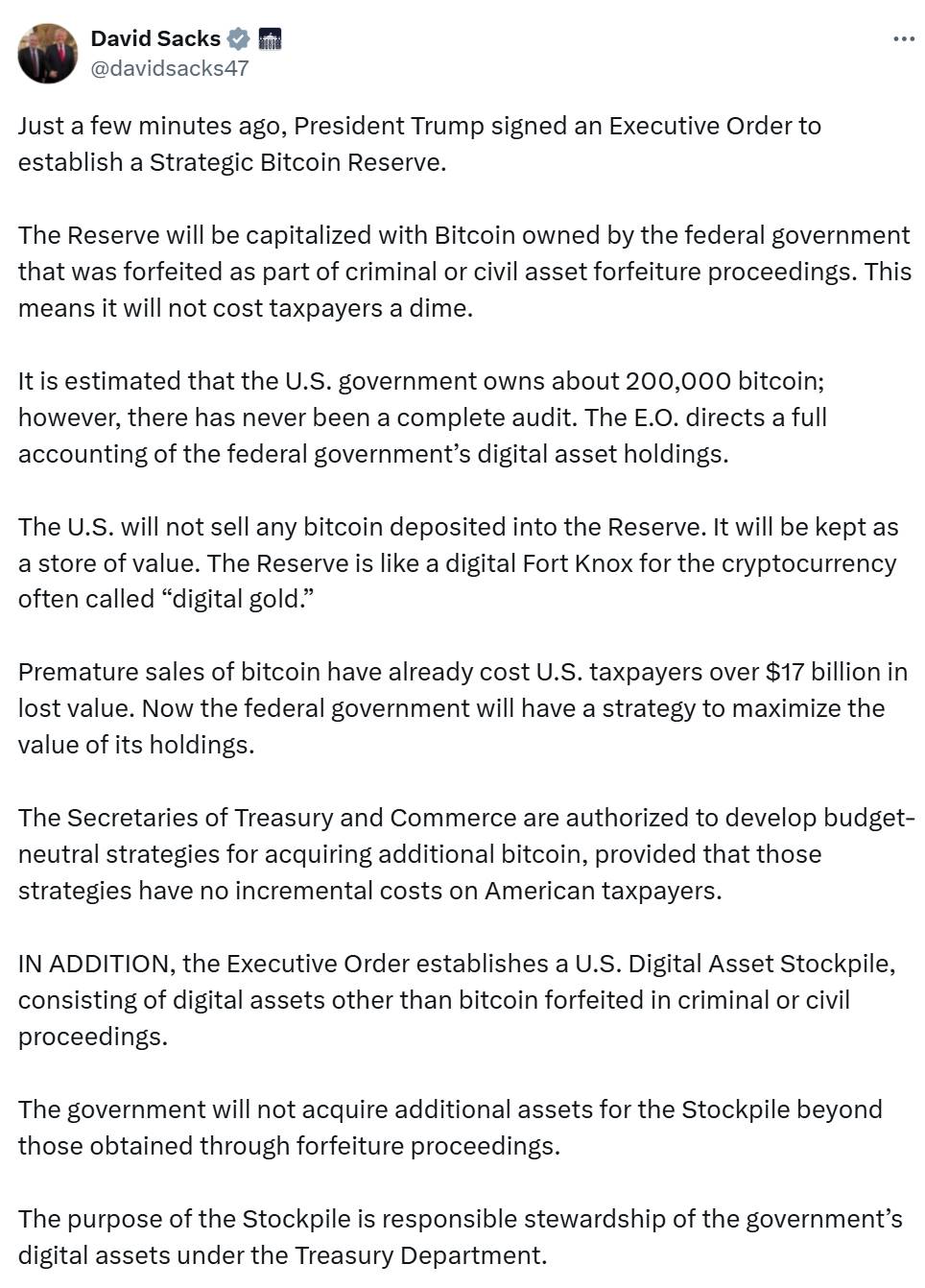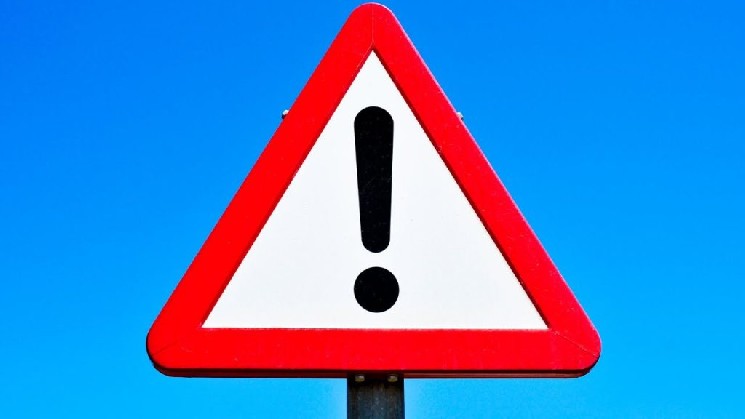Author: 1912212.eth, Foresight News
On March 7, Trump signed a high-profile executive order officially announcing the establishment of the "Strategic Bitcoin Reserve" (SBR) of the United States. This move fulfills some of his campaign promises, aiming to incorporate Bitcoin into the national financial strategy. In addition, the executive order also established the U.S. Digital Asset Reserve, which includes digital assets other than Bitcoin confiscated in criminal or civil proceedings, with the Treasury Secretary determining a responsible management strategy, including the potential sale of the U.S. Digital Asset Inventory. (Bitcoin can be bought, provided that these strategies do not incur additional costs for U.S. taxpayers.)
However, a sentence subsequently added by David Sacks, the White House's AI and Crypto Affairs official, sparked intense market and public reaction: "Aside from the Bitcoin obtained through criminal or civil asset forfeiture procedures, the government will not purchase any additional assets for this fledgling digital asset inventory." Even days earlier, Farcaster co-founder Dan Romero had tweeted a prediction about the crypto asset reserve: the government would only retain the seized assets and would not make new purchases. Now, it seems his prediction has come true.

With this statement, the market price fluctuated, with BTC falling from around $91,000 to around $84,000 around 8 a.m. this morning, before rebounding to around $87,000, a 4.9% price fluctuation within an hour.
Is this a milestone in the history of cryptocurrencies, or a scaled-down version of Trump's crypto president promises?
From Campaign Promises to Policy Implementation
As early as the 2024 election campaign, Trump frequently showed goodwill towards the cryptocurrency industry, promising to make the U.S. the global capital of cryptocurrencies. At the Nashville Bitcoin Conference, he stated that if elected, he would retain the government's Bitcoin holdings and establish a strategic reserve to counter potential risks to the U.S. dollar and promote financial innovation. At the time, the U.S. government had confiscated about 200,000 Bitcoins through cracking down on illegal activities (such as Dark Web transactions and Ponzi schemes), worth over $20 billion at current prices. These assets became the foundation of Trump's envisioned reserve and were seen as a zero-cost starting point for his policy implementation.
The signing of this executive order has turned this vision into reality. However, the reserve will be based on existing confiscated assets, not involving taxpayer funds, positioned as a value storage tool, and it is clearly stated that it will not be sold. This is in stark contrast to Trump's previous boast that "Bitcoin will surpass gold," and also raises doubts about the specific implementation strength.
Market Reaction
After the executive order was announced, some were disappointed, while others expressed optimism. The disappointed ones said the executive order did not provide any substantive positive news. In comparison, the market's optimistic sentiment still dominates.
Coinbase's chief analyst, David Duong, analyzed that "for those who are disappointed that the U.S. government has not continued to accumulate Bitcoin, they have completely missed the point. This is extremely positive in the long run. Future inflows of funds will come from those long-term institutional investors who have more confidence in Bitcoin as an important global, supranational asset."
Bitwise's Chief Investment Officer, Matt Hougan, stated that the impact of the U.S. Strategic Bitcoin Reserve will:
1) Significantly reduce the likelihood of the U.S. government "banning" Bitcoin in the future;
2) Significantly increase the likelihood of other countries establishing strategic Bitcoin reserves;
3) Accelerate the process of other countries considering establishing strategic Bitcoin reserves, as this creates a short-term window for them to get ahead of potential accumulation actions by the U.S.;
4) Make it more difficult for various institutions - from national-level wealth management platforms to quasi-governmental institutions like the IMF - to describe Bitcoin as a dangerous or unsuitable asset to hold.
From a symbolic perspective, this move is undoubtedly an important milestone in the history of Bitcoin's development. As the first U.S. president to explicitly incorporate Bitcoin into the national strategy, Trump's move may further promote the legalization and mainstreaming of cryptocurrencies.
As Sacks said, this indicates that Bitcoin has risen from a fringe asset to a value storage tool at the national level, and the vision of it being on par with gold, foreign exchange reserves, may no longer be distant. Furthermore, this may also motivate more countries to follow suit - Brazil and Poland have already proposed similar reserve plans.
However, the decision not to make additional purchases also reveals the limitations of the policy. In comparison, if the U.S. were to use fiscal funds to purchase more Bitcoin, not only could it directly drive up the price, but it could also take the initiative in the global reserve race.
Now, relying solely on confiscated assets, the reserve size is limited, and it cannot influence market trends through active investment. Analysts point out that this may reflect the compromises made by the Trump administration under fiscal pressure and internal opposition. After all, a comprehensive purchase plan requires Congressional approval, and the Republican Party's attitude towards cryptocurrencies is not monolithic.
Future Outlook
Globally, Bitcoin reserves are becoming an emerging trend. Brazil plans to use it as an anti-inflation tool, while Poland sees it as a means of economic diversification. In comparison, although the U.S. move is pioneering, it appears conservative due to the "zero new additions" limitation.
The executive order on the Bitcoin strategic reserve signed by Trump is both a landmark step for cryptocurrencies to enter national strategy, and controversial due to the limitation of not making additional purchases. In the short term, the Bitcoin market may be under pressure due to unmet expectations; in the long run, the symbolic significance of this reserve may reshape the global financial landscape. However, whether its scale and influence can match Trump's grandiose rhetoric remains to be seen. What is the next step for the Bitcoin strategic reserve? Perhaps the answer can only be revealed by waiting for the subsequent policy details and market feedback.






